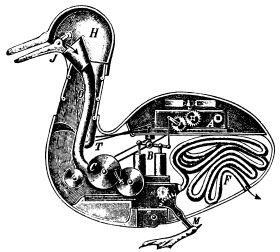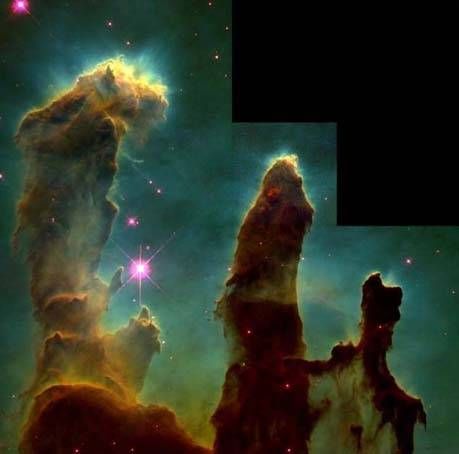 Determinism
DeterminismI'm also determined to make that joke it's become so obsessive I can't decide not to make it. Nevertheless I've been arguing free a lot on CARM lattely. This is one where the atheists seem to think they really have it but the scientific mystique of the philosophical position is just a scam. Atheists cling o a reductionism that has created a pesudo-scinece that tries to erase all human responsibility.On
Atheist watch recently (April 4) I quoted from
a blog by a 30 year Atheist who is sick of the psued0 scinece of atheism he in turn quotes a famous researcher of neuro-science,
Raymond Tallis, who says says flat out most of what atheists talk about when they use that term is just bunk. He says
"If you come across a new discipline with the prefix “neuro” and it is not to do with the nervous system itself, switch on your ...[BS] detector. If it has society in its sights, reach for your gun. Bring on the neurosceptics." He didn't use the term "BS" he used the term BS stands for. They assert that it's born out and proved scientifically but all they are really doing is copying reductionist rhetoric that has nothing to do with scientific fact. One of the major sources for this sort of thinking is still
Consciousness Explained by Daniel Dennett who published in the early 90s. See my summary of my friend's article "The Hard Sell of Human Consciousness,"* by Lantz Miller, published in my Journal Negations[1] (the academic journal I published in the 90s). There also a
summary version of Miller's article on my Doxa website.
Atheist guru Sam Harris also has a book arguing against free will called
Free Will.
Of course the reason for their insistence upon the scientific basis for the destruction of human experience is to free themselves of the responsibly of sin. They will argue that they can't help anything they do because we are just amalgams of causes, just bundled of effects of thousands of causes and every single thing we do is determined by a cause so don't choose any behavior of our own. While most of them will initially assert a form of compatibility (free will and determinism are compatible) as the argument heats they will rely on determinism more and more in relation to freedom from the guilt of sin.
Their case really turns on two points:
(1) brain damage alters forms of conscoiusness(2) everything has to have a cause.They will assert these ideas until dooms day and never listen to the answers. The first point is cleaver and it's a done deal as they think it is. One find the attitude expressed often there's no way around this it's absolute proof. It's obvious we are talking damaging part fo the brain of cousre that's going to effect consciousness. So will death. that proves that consciousness is related to brain, no one questions that. It doesn't prove that's reducible to the brain, that it's nothing more than Brain chemistry. The issue of brain damage could just as easily be one of access. Two analogies: On computer hardware is not software. If you take a baseball bat and beat the fu out of your hard drive you can't access your soft ware. That doesn't' mean the soft ware is just a myth and it's really just hardware. Destroying the hard drive does not in itself change the soft ware. Of a tv set, one might argue the programs originate in the box. They are not broadcast through the air but they are actually products of the box. We know this is foolish but hey if you damage the tv set you don't get the shows anymore. By atheist logic that should prove the programs originate in the tv.
If we have a core conscoiusness of some sort and the hardware of the brain access it then damaging it might alter the access while not changing the actual mind. It might be that mind is produced by the neural net but not reducible to it. This is a subtle concept and atheist just dont' want to hear it, and I have a feeling some of them can't understand it. The brain and the mind are inseparable but one is not reducible to the other. This is like saying the wave and the energy that makes it a wave are the same thing but they are separable either.
There are two major sources one should read to understand the counter arguments to this kind of reductionism. There is not time to go into them deeply but just to offer the sources and hope the reader will follow up. The first and most important one is Philosopher David Chalmers.[2] One of Chalmer's Major arguments is that
The Second second source one needs to counter the reductionsts is
Andrew Newberg's Why God Wont Go Away.Newberg,
Why God Won’t God Away: Brain Science and the Biology of Belief. (New York, Ballentine Books), 2001, pp. 157-172.
A skeptic might suggest that a biological origin to all spiritual longings and experiences, including the universal human yearning to connect with something divine, could be explained as a delusion caused by the chemical misfiring of a bundle of nerve cells. But …After years of scientific study, and careful consideration of the a neurological process that has evolved to allow us humans to transcend material existence and acknowledge and connect with a deeper, more spiritual part of ourselves perceived of as an absolute, universal reality that connects us to all that is.
…Tracing spiritual experience to neurological behavior does not disprove its realness. If God does exist, for example, and if He appeared to you in some incarnation, you would have no way of experiencing His presence, except as part of a neurologically generated rendition of reality. You would need auditory processing to hear his voice, visual processing to see His face, and cognitive processing to make sense of his message. Even if he spoke to you mystically, without words, you would need cognitive functions to comprehend his meaning, and input form the brain’s emotional centers to fill you with rapture and awe. Neurology makes it clear: there is no other way for God to get into your head except through the brain’s neural pathways. Correspondingly, God cannot exist as a concept or as reality anyplace else but in your mind. In this sense, both spiritual experiences and experiences of a more ordinary material nature are made real to the mind in the very same way—through the processing powers of the brain and the cognitive functions of the mind. Whatever the ultimate nature of spiritual experience might be—weather it is in fact an actual perception of spiritual reality—or merely an interpretation of sheer neurological function—all that is meaningful in human spirituality happens in the mind. In other words, the mind is mystical by default. (p 37)
The medieval German mystic Meister Echkart lived hundreds of years before the science of neurology was born. Yet it seems he had intuitively grasped one of the fundamental principles of the discipline: What we think of, as reality is only a rendition of reality that is created by the brain. Our modern understanding of the brain’s perceptual powers bears him out. Nothing enters consciousness whole. There is no direct, objective experience of reality. All the things the mind perceives—all thoughts, feelings, hunches, memories, insights, desires, and revelations—have been assembled piece by piece by the processing powers of the brain from the swirl of neural blimps. The idea that our experiences of reality—all our experiences, for that matter—are only “secondhand” depictions of what may or may not be objectively real, raises some profound questions about the most basic truths of human existence and the neurological nature of spiritual experience. For example our experiment with Tibetan mediators and Franciscan nuns showed that the events they considered spiritual were, in fact, associated with observable neurological activity. In a reductionist sense this could support the argument that religious experience is only imagined neurologically, that God is physically ‘all in your mind.’ But a full understanding of the way in which the brain and the mind assemble and experience reality suggests a very different view.(Ibid. pp. 35-36)
To the second point about causes the atheists here play off of science and the ideology of physicalism. In the assumption of physicalism/materialism and science everything needs a cause. They they assert that all ideas need causes. Since eveyrthing we think is caused then they assert that all our thoughts are determined, therefore all choices are determined. Thus we are not accountable for what we choose. This idea is based a string of false assumptions.
(1) Ideas must be physical things since they believe consciousness is reducible to chemistry.
(2) The assumption is that since all physical things are caused, thought is a physical thing, thought must be caused by the kinds of external causes that effect all physical things.
(3) They assert that ordinary cause and effect is the same as determinism.
(4) they assert that only one outcome is possible for a cause, one cause = one effect.
These are all false assumptions and they make up the thread of the argument that cause and effect proves determinism and rules out free choice. There is no proof that ideas are physical things and there's a lot of evidence against the notion that consciousness is reducible to chemistry. The evidence above, Miller, Chalmers and Newberg is all against it, as well the
wealth of information on Doxa. We do not know what consciousness is, one of Chalmer's major points. So we can't say it's physical, if it is that doesn't mean it's caused in the same sense that thing are caused externally. Ideas in the mind are not necessarily influenced in the way way that causes in the external world are. Ordinary cause and effect is not determinism. Not that one cause necessarily leads to more than
one effect at a time, but more than one outcome from a given cause is possible. We don't know all the factors that effect outcomes in our minds.
The way the Dawkinsian atheists/reductionists tell it one would think there is no "I" or "me." There is no actual persona it's just an illusion. The idea of free will deemed to be illusry but the idea of causes fighting it out is taken as the one and only means of understand why we do what we do or think what we think. Everything we think is forced upon us by external forces and genetics so that there is no "I" to think. When Descartes says "I think therefore I am" this is just an illusion. He should say "a set of forces are acting upon biomass and I think what I am determined to think, therefore I am." Of course this ridiculous nonsense would not even satisfy the rational for the
cogito in the first place.
What happens when someone stops smoking? One set of causes push against the automaton for years and then finally build to a point that one day there are more of them then there are the influences form the first set of behaviors that d determined smoking? Anyone who has tried to quite smoking knows that without a will, no personal initiative and desire there's no quitting. Of course that would drive the skeptic in to the rant, "what influences imitative?" The desire not to die of cancer is the cause that determines the response." Of course it failed to do so for years, why did it suddenly succeed? why at the when this automaton said "I want to quite?"
It's prefectly plausible to conceive of a set of innate internal thought categories, perhaps put there by God or perhaps emergent properties, that the internal editor uses to decides from among the alternatives and is thus enabled to judge her own behavior and to say "I am not satisfied with this behavior I will change." The basic desire originates within it us in those categories and we able to use that to weight the various influences and choose a response.
The real danger is not just in seeing oneself as well human and less free, although that's enough to motivate opposition, the real danger is that in seeking to avoid responsibly of sin the skeptic is also closing down inner life, but his own and those of others who fool enough to believe the ideology. we no longer understand what it means to contemplate God or commit to truth.
[1]The original article by Miller is in two parts.
follow the link then click on "winter 1998"

part 2 click on Spring of 2000, you have to scroll through that whole issue for 2000 to get the last article which is part 2. This article is well worth reading as it really trounces Dennett.
[2]David Chalmers, The Conscious Mind: In Search of a theory. England, New York: Oxford University Press, 1996. on line version: http://www.scribd.com/doc/16574382/David-Chalmers-The-Conscious-Mind-Philosophy Scribd, David Chalmers, The Conscious Mind: In Search of a Theory of Conscious Experience, webstie Department of Philosophy, University of California at Santa Cruz, July 22 1995, visited 3/1/11 on line page numbers apply.
Chalmers is a major philosopher, his book is hard and difficult to read, although he's a good writer but the material is complex. Yet he is also a fun loving guy.
He does a spoof of a blues singer on You Tube, "Zombie Blues" about one of his major arguemnts. If you listen to the lyrics he whole issue is put to rest in a few simple lines. The parody is hilarious.
"I act like you act
I do what you do
but I don't know what it's like
to be you.
what consciousness is
I don't got a blue."




